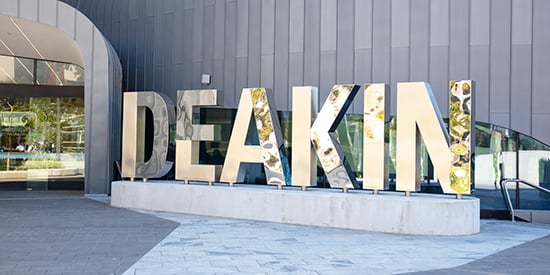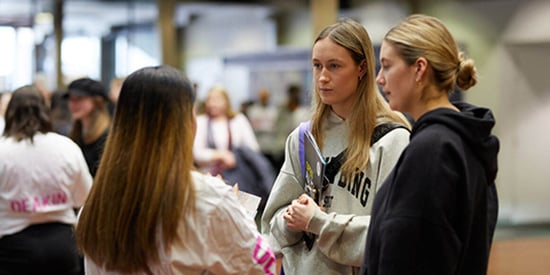Key facts
Duration
0.5year full-time or part-time equivalent
Locations
Current Deakin Students
To access your official course details for the year you started your degree, please visit the handbook
Course overview
Explore development programs that make a real difference to millions of people worldwide with the Graduate Certificate of International and Community Development. This course offers an introduction to global and local development challenges and opportunities, and provides a guaranteed pathway to our masters degree.
Unique challenges and opportunities face us all. Do you want to contribute to a sustainable and equitable future for all? Why not turn one of your strengths into a successful and rewarding career?
If considering pathways to a more sustainable future is a job you’d love waking up to, the Graduate Certificate of International and Community Development gives you the tools to do more of what you’re passionate about each and every day. The course gives you a deep understanding of the challenges facing humanity and the planet. It builds your foundational knowledge of international and community development and introduces you to initiatives that promote justice, reduce poverty and build sustainable living environments for the people who need it most. You’ll be guided by academic staff with extensive professional experience within the sector and course content is finely tuned to the state of local and global events that impact development – just two of the reasons why our graduates are better prepared for their current and future roles.
This course can be used as a stepping stone into the Master of International and Community Development. It’s made up of two core units and two elective units from the masters course, so you will be able to find out which topics you want to learn more about before articulating into the masters. Whichever units you choose, you will be developing a balance of theoretical knowledge and practical skills that allow you to respond to challenges like poverty, disempowerment, inequality and environmental vulnerability.
Currently working within the sector or busy with other commitments? This course is delivered on our premium online learning platform, so you can study when and where it suits you and achieve your career goals on your schedule.
Read MoreCourse information
- Award granted
- Graduate Certificate of International and Community Development
- Year
2024 course information
- Deakin code
- A565
- Level
- Postgraduate (Graduate Certificate and Graduate Diploma)
- Australian Qualifications Framework (AQF) recognition
The award conferred upon completion is recognised in the Australian Qualifications Framework at Level 8
Course structure
To qualify for the award of Graduate Certificate of International and Community Development, a student must successfully complete 4 credit points of study as listed below and
2
Core units
2
Elective units
4
Total units
Core units
Intakes by location
The availability of a course varies across locations and intakes. This means that a course offered in Trimester 1 may not be offered in the same location for Trimester 2 or 3. Check each intake for up-to-date information on when and where you can commence your studies.
Trimester 1 - March
- Start date: March
- Available at:
- Online
Trimester 2 - July
- Start date: July
- Available at:
- Online
Trimester 3 - November
- Start date: November
- Available at:
- Online
Additional course information
Course duration
Course duration may be affected by delays in completing course requirements, such as accessing or completing work placements.
Mandatory student checks
Any unit which contains work integrated learning, a community placement or interaction with the community may require a police check, Working with Children Check or other check.
Participation requirements
Reasonable adjustments to participation and other course requirements will be made for students with a disability. More information available at Disability support services.
Work experience
Elective units may provide the opportunity for Work Integrated Learning experiences.
Entry requirements
Selection is based on a holistic consideration of your academic merit, work experience, likelihood of success, availability of places, participation requirements, regulatory requirements, and individual circumstances. You will need to meet the minimum academic and English language proficiency requirements to be considered for selection, but this does not guarantee admission.
Academic requirements
To be considered for admission to this degree you will need to meet at least one of the following criteria:
- completion of a bachelor degree or higher
- at least two years' relevant work experience (or part-time equivalent)
English language proficiency requirements
To meet the English language proficiency requirements of this course, you will need to demonstrate at least one of the following:
- bachelor degree from a recognised English-speaking country
- IELTS overall score of 6.5 (with no band score less than 6.0) or equivalent
- other evidence of English language proficiency (learn more about other ways to satisfy the requirements)
Admissions information
Learn more about Deakin courses and how we compare to other universities when it comes to the quality of our teaching and learning.
Not sure if you can get into Deakin postgraduate study? Postgraduate study doesn’t have to be a balancing act; we provide flexible course entry and exit options based on your desired career outcomes and the time you are able to commit to your study.
Recognition of prior learning
If you have completed previous studies which you believe may reduce the number of units you have to complete at Deakin, indicate in the appropriate section on your application that you wish to be considered for credit transfer. You will need to provide a certified copy of your previous course details so your credit can be determined. If you are eligible, your offer letter will then contain information about your credit transfer. Your credit transfer is formally approved prior to your enrolment at Deakin during the Enrolment and Orientation Program. You must bring original documents relating to your previous study so that this approval can occur.
You can also refer to the Recognition of prior learning system which outlines the credit that may be granted towards a Deakin University degree.
Fees and scholarships
Fee information
The 'Estimated tuition fee' is provided as a guide only based on a typical enrolment of students completing this course within the same year in which they started. The cost will vary depending on the units you choose, your study load, the length of your course and any approved Recognition of prior learning you have.
The 'Estimated tuition fee' is calculated by adding together four credit points of study. Four credit points is used as it represents a typical enrolment load for a Graduate Certificate.
Each unit you enrol in has a credit point value. You can find the credit point value of each unit under the Unit Description by searching for the unit in the Handbook.
Learn more about tuition fees.
Scholarship options
A Deakin scholarship might change your life. If you've got something special to offer Deakin – or you just need the financial help to get you here – we may have a scholarship opportunity for you.
Postgraduate bursary
If you’re a Deakin alumnus commencing a postgraduate award course, you may be eligible to receive a 10% reduction per unit on your enrolment fees.
Apply now
Applications can be made directly to the University through StudyLink Connect - Deakin University's International Student Application Service. For information on the application process and closing dates, see the How to apply web page.
Fill out the application form and submit to a Deakin International office or take your application form to a Deakin representative for assistance
For information on the application process and closing dates, see the How to apply webpage.
If you’re still having problems, please contact Deakin International for assistance.
Entry pathways
A shorter course duration is available to students entering from a same discipline background. A 'same discipline' award for this course is any tagged Bachelor degree (min 3 years) or Bachelor degree (min 3 years) with a major sequence in International Politics, Development Studies, Community Development, International Studies, International Relations, or Development Policy.
| Highest same discipline award held at point of entry | Reduction in course duration | Remaining course duration |
| Bachelor, same discipline | 0.25 years (2 credit points) | 0.25 years full-time, or part-time equivalent (2 credit points) |
Careers
Career outcomes
The practical skills you gain throughout the course will prepare you for roles in all organisations that respond to challenges relating to social justice, empowerment, poverty and community development. These include:
- international and domestic non-government organisations
- government agencies
- local community organisations, councils and other civil society actors
- Commonwealth departments such as the Department of Foreign Affairs and Trade (DFAT)
- international aid and development agencies such as the United Nations Development Programme (UNDP) and other UN agencies
- bilateral and multilateral agencies.
There is also the potential to work in related areas, such as:
- social enterprise and other private sector business
- teaching
- travel
- consulting
- journalism
- government and non-government agencies concerned with the flow of trade, services, capital and personnel.
For those looking to continue their studies, this course is a guaranteed pathway into the Master of International and Community Development.
For more information go to DeakinTALENT.
Course learning outcomes
Deakin's graduate learning outcomes describe the knowledge and capabilities graduates can demonstrate at the completion of their course. These outcomes mean that regardless of the Deakin course you undertake, you can rest assured your degree will teach you the skills and professional attributes that employers value. They'll set you up to learn and work effectively in the future.
| Deakin Graduate Learning Outcomes | Course Learning Outcomes |
| Discipline-specific knowledge and capabilities | Investigate, comprehend and apply specialised and critical understanding of the theory and practice of international and community development and the contribution of diverse disciplinary worldviews. |
| Communication | Apply advanced oral, written and interpersonal communication to plan, inform, and debate, complex multidisciplinary and multi-sectoral issues for improved social, environmental and economic outcomes to a range of audiences. |
| Digital literacy | Use advanced knowledge of digital information sources and applications to source, apply, analyse and report on complex data and information for effective research and professional development, across interpersonal, organisational and professional cultures. |
| Critical thinking | Research, critically analyse, report and act on global and local issues and opportunities in historical and contemporary development discourse |
| Problem solving | Comprehend, interpret and evaluate competing options for solving complex or “wicked” problems with creativity, innovation and respect. |
| Self-management | Demonstrate autonomy, responsibility, respect and accountability and a continued commitment reflective practice and ongoing learning in diverse international and community development contexts. |
| Teamwork | Contribute to effective collaboration, participation and achievement of mutually agreed upon team outcomes through active, engaged, respectful and self-reflective participation in research and practice, across practice, cultures and disciplines. |
| Global citizenship | Question, engage and examine a range of social justice, environmental, and development issues taking into consideration indigenous, local and global contexts. |
| Approved by Faculty Board November 2018 | |




